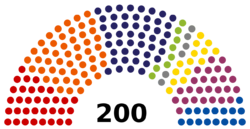Czech Parliament
|
Parliament of the Czech Republic Parlament České republiky |
|
|---|---|
 |
|
| Type | |
| Type | |
| Houses |
Senate Chamber of Deputies |
| Leadership | |
| Structure | |
| Seats |
|
 |
|
|
Political groups
|
|
 |
|
|
Political groups
|
|
| Elections | |
| Two-round system | |
| Proportional representation | |
|
Last election
|
10–11 October 2014 17–18 October 2014 |
|
Last election
|
25–26 October 2013 |
| Meeting place | |
| Palaces in Malá Strana, Prague | |
| Website | |
|
Senate Chamber of Deputies |
|
The Parliament of the Czech Republic (Czech: Parlament České republiky) or just Parliament (Czech: Parlament) is the legislative body of the Czech Republic, seated in Malá Strana, Prague.
It consists of two chambers, both elected in direct elections:
Art. 15 of the Constitution stipulates its name as the "Parliament". The Parliament exercises competences usual in parliamentary systems: it holds and passes bills, has the right to modify the Constitution, ratifies international agreements; if necessary, it declares war, approves presence of foreign military forces in the Czech Republic or a dispatch of Czech military forces abroad.
The tradition of modern parliamentarianism in the Bohemian lands dates back to times of the Austrian Empire (and then Cisleithanian part of Austria-Hungary), where the Imperial Council (Reichsrat, Říšská rada) was created in 1861.
After proclamation of Czechoslovakia in 1918 its National Assembly (Národní shromáždění) undertook legislative duties both of the Imperial Council and State Diets (Bohemian, Moravian, Silesian). In 1938–39 and between 1948–89 there existed a parliament within non-democratic regimes (semi-authoritarian or Communist regime, respectively). As a consequence of federalization of Czechoslovakia (1968), national councils of Czech and Slovak parts of the country were created.
...
Wikipedia
